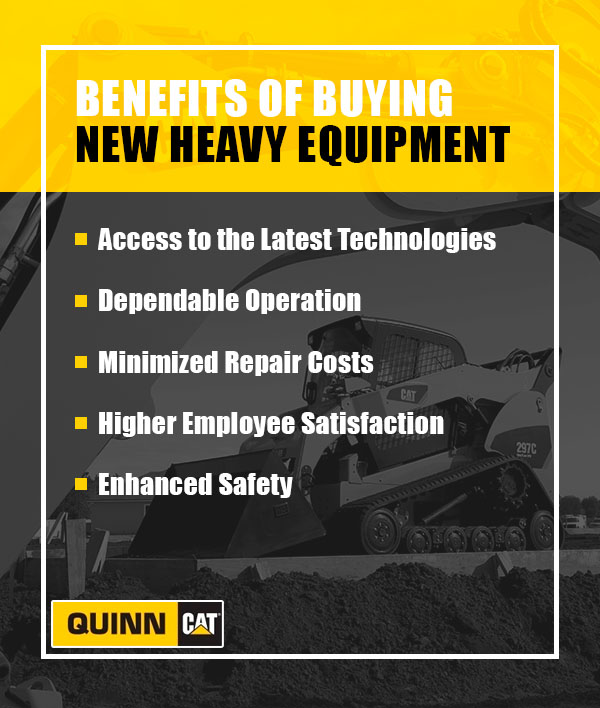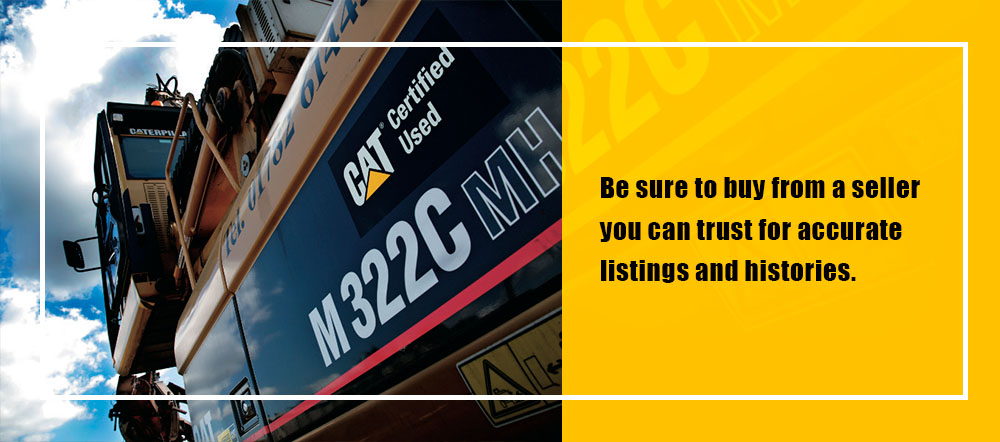If you’re considering adding a machine to your fleet, you have a choice to make — will you purchase new or used construction equipment? While both are viable options, it’s important to consider the pros and cons of each. These choices come with different financial requirements, risk levels and operational expectations you should learn about before making your decision.

Pros of Buying New Heavy Equipment
When you think of new construction equipment, you probably also think of high purchase prices. While it’s true that companies pay more for new equipment, these machines offer various advantages that can help to offset their higher upfront costs.
1. Access to the Latest Technologies
Manufacturers are constantly making technological breakthroughs when developing new construction equipment, implementing changes to further improve operation, safety and efficiency. Because newer equipment models tend to be more technologically advanced, they allow companies to accomplish more at an even faster rate.
Your company will enjoy the latest technologies when you purchase new machines for your fleet, ranging from smart systems to engineering improvements to greater fuel efficiency.
2. Dependable Operation
When you purchase new heavy equipment for your company, you know that you’ll be the first crew to use it. That means you won’t have to worry about hidden damage or unreliable operation due to previous misuse. Instead, you receive a brand-new machine you can depend on.
3. Minimized Repair Costs
With more reliable operation comes fewer repair needs. That’s because newer machines are far less likely to experience operating issues, malfunctions or breakdowns than used ones.
While new construction equipment still requires routine maintenance services to stay in peak operating condition, it shouldn’t need any major repairs — at least not until years down the line. So while new equipment costs more money upfront, it ultimately saves your company money in the long term.
4. Higher Employee Satisfaction
With new technology, up-to-date machinery is more comfortable and easier to operate than older equipment. When your construction crew feels comfortable and confident controlling your machines, you can expect them to achieve more on the job site.
5. Enhanced Safety
Every company that uses construction equipment knows the importance of job site safety. Older equipment can compromise operator safety and increase the risk of accidents due to old parts and past wear and tear.
Because new equipment features brand-new components, it promotes a safer work environment. These machines can also come with advanced safety features you won’t find with older equipment.
Cons of Buying New Heavy Equipment
While new construction equipment is an excellent investment, it also has its downsides. If you’re thinking about purchasing a new machine for your fleet, be sure to consider these factors in addition to the benefits.
1. High Initial Cost
The most obvious disadvantage of buying new heavy equipment is the high purchase price. While some machine types will cost less than others, you can expect to pay a significantly higher price than you would for used equipment. If you’re unable to pay these costs upfront, you may need to look into financing, which results in higher interest rates for your company.
2. More Training Requirements
Though advanced technology provides many operational benefits to construction and engineering companies, it also creates a learning curve for crew members. When you purchase new construction equipment, you’ll have to dedicate some extra time and resources to training. Your team needs a comprehensive understanding of your new equipment and all its features before they can get to work safely and efficiently.
3. Rapid Depreciation
New construction machines quickly decrease in value over the first few years of their life span. As a result, companies that buy them usually see a much lower return on investment (ROI) than they would with used equipment. That means if you ever decide to sell your new machines, you’ll likely receive less money than you paid for them due to loss of resale value.
4. Longer Lead Times
Just because a piece of machinery is listed online doesn’t mean it’s immediately available. It takes time to manufacture new machines, which can impact lead times. If you need your construction equipment within a certain time frame, used may be a better option. You may have to wait weeks or even months before you receive a new machine.
Pros of Buying Used Heavy Equipment
There are plenty of good reasons to buy used construction equipment rather than new equipment, especially in today’s competitive marketplace. One of the primary advantages of buying used heavy equipment is its lower price, but it has other advantages as well. If you’re a contractor looking to invest in a new piece of heavy equipment to expand your capabilities, then consider these benefits of buying used construction equipment.
1. Lower Upfront Cost
One of the most obvious reasons to buy used machinery is that it’s much less expensive than new equipment. When buying anything new, whether it’s a car, house or piece of heavy equipment, a significant portion of what you’re paying for is the newness of the item and not necessarily its true value. The fact is that used heavy equipment, when well-maintained and properly serviced, is just as valuable to your business as a new piece of equipment but at a fraction of the cost. With used equipment, you’ll spend a lot less upfront, which can get your business up and running faster while reserving your cash for other business investments, like hiring and training operators.
2. Avoid Depreciation Loss
As mentioned, when buying new equipment, you’re paying for its newness. But new equipment will eventually stop being new, meaning its value will diminish over time. This reduction in value, known as depreciation, is a natural cost of doing business. Used items continue to be worth less and less over time, but the biggest depreciation occurs within a machine’s first couple of years. When you buy new equipment, you absorb the primary depreciation cost, which may be up to half of the machine’s cost, depending on current market demands. By buying used equipment, the major depreciation loss has already happened, meaning you can get a newer piece of equipment without paying the initial sticker price.
3. Reduced Insurance Rates
Because new equipment costs more, it’s also more expensive to insure than used equipment, so the upfront cost is higher and it will also have higher carrying costs due to greater insurance premiums. If something does go wrong with your new machine, you could end up overpaying on insurance premiums as insurance companies will assess the equipment’s replacement cost as the value of a brand new machine — even if yours has already depreciated.
4. More Selection
The market for used heavy equipment is massive. Because there’s much more demand for used equipment than new equipment, used equipment stays in circulation at a higher rate than new equipment is manufactured. It’s projected that the global market value for used heavy equipment in 2020 will reach nearly $90 billion. This means that there will continue to be a much wider selection of equipment in the used market than in new inventory. You’ll likely have a better chance of finding the right equipment for your business at the right price when turning to the used heavy equipment market.
5. Greater Contract Flexibility
Construction is a highly competitive industry, and contractors need to remain flexible to fulfill more contracts quickly. With used equipment, you can easily acquire the right machine for an upcoming project and then re-sell it when the contract is complete. You might not find this flexibility with new equipment since there are usually wait times for new orders. Additionally, you’ll experience limited depreciation when buying and re-selling used equipment in a narrow time frame compared to an investment in a new machine.
6. Quicker Uptime
When you buy used equipment, you can typically find machines that you or your operators are already familiar with – they’ll have the same or similar controls and technology. When buying new equipment, you’ll likely be faced with a new generation of technology, which will come with a learning curve. Buying used equipment can improve uptime because there may be less training involved.
Cons of Buying Used Heavy Equipment
Like new machines, buying used construction equipment also has its drawbacks. Consider the potential disadvantages of buying used machinery before making your decision.
1. Intensive Purchase Process
Buying a used piece of equipment requires some extra time and effort on your part. First, you’ll have to search the market to find the machine you’re looking for — and there are no guarantees that someone will be selling it.
Once you find the equipment, you’ll need to research the seller to make sure they’re a reputable source. Then you should get the equipment inspected to ensure the listing is accurate and the machinery doesn’t have any major technical issues or safety concerns.
You can shorten this process by purchasing used equipment from a dependable dealer like Quinn Company. We carry a vast selection of used machines, complete with comprehensive service histories and inspection reports. You can be sure you’re getting equipment you can rely on.
2. Questionable Conditions
Used machines may have existing issues caused by the previous owners. For example, the last company may have let preventive maintenance or repair needs go by the wayside. In these cases, you may receive an unreliable machine that will cost you more money down the line. Be sure to buy from a seller you can trust for accurate listings and histories.
Purchase Used Construction Equipment for Your Fleet at Quinn Company Today
Whether you decide to buy a new or used piece of equipment for your fleet, Quinn Company can provide a dependable, efficient machine you can trust. We sell and service a full line of new machines and used Cat equipment for applications ranging from agricultural to construction to material handling. With over a century of experience, we’re the expert dealers you can count on.
Visit one of our convenient store locations or contact us to learn more about our equipment options today!


